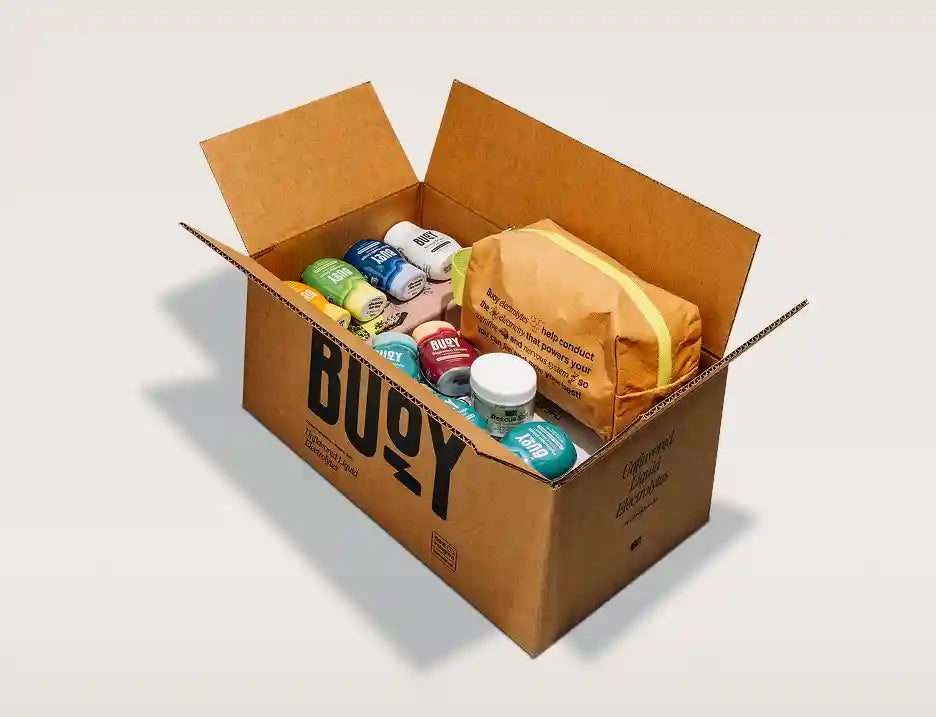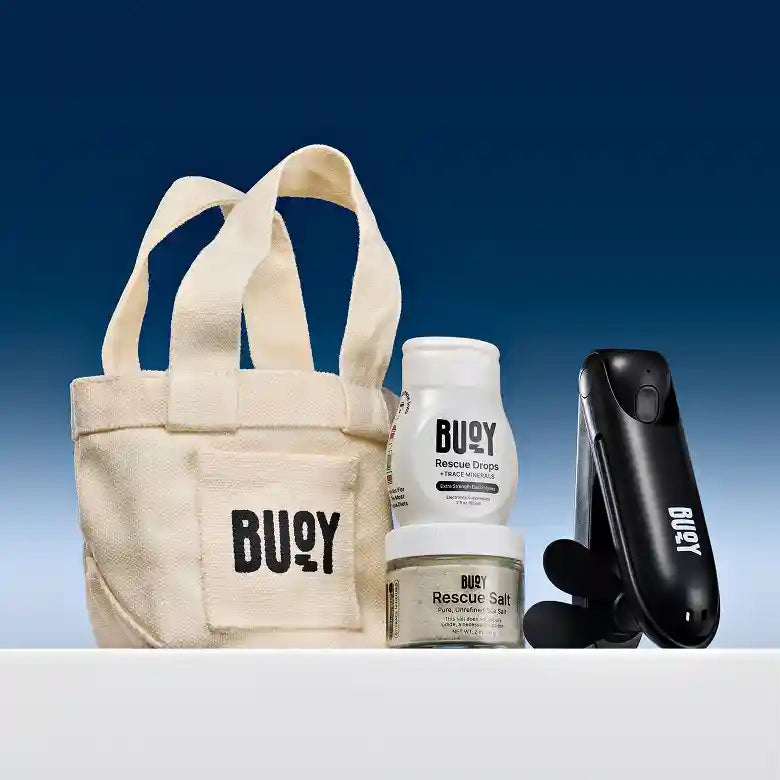
How to Hydrate Without Water
Share
Did you know that your morning cup of herbal tea or even that juicy slice of watermelon could be hydrating you just as effectively as water? Often hailed as the king of hydration, water certainly plays a pivotal role in our health and well-being.
But what if you're tired of the same old sips? Or maybe you're looking to diversify your hydration sources. The good news: water doesn't hold a monopoly on keeping you hydrated.
Essential Takeaways:
- Mix Up Your Hydration Methods: Drinking water isn't your only option for staying hydrated. From water-rich foods to herbal teas and coconut water, diverse fluid sources can both nourish your body and satisfy your taste buds.
- Optimize Your Hydration with Buoy: Standard water contains some electrolytes, but not in concentrated form. Hydration Drops offer an easy, effective way to boost electrolyte levels, improving your overall hydration and well-being.
In this blog post, we'll journey beyond the water bottle to discover diverse and delicious ways to stay hydrated. From herbal teas and water-rich foods to natural electrolytes, let's expand our horizons and explore the various paths to optimal hydration.
- Introduction: Exploring Alternative Hydration Sources
- Hydration Beyond Water: Creative Solutions
- Water-Rich Foods: A Hydration Boost
- Herbal Teas: Nourishing Hydration
- Infused Water: Flavorful Hydration
- Coconut Water: Nature's Electrolyte Drink
- Hydrating Fruits and Vegetables
- Milk and Plant-Based Alternatives
- Conclusion: Diverse Paths to Hydration
Introduction: Exploring Alternative Hydration Sources
Hydration is the cornerstone of good health and well-being. We often hear that drinking water is essential for maintaining bodily functions, from aiding digestion to keeping our skin glowing (1).
But what if you’re tired of plain water or are looking for different ways to keep hydrated? Fortunately, there are numerous alternative sources of hydration that are equally effective, and perhaps even more enjoyable.
Hydration Beyond Water: Creative Solutions
When you think of hydration, water naturally comes to mind. However, there are several other ways to stay hydrated that you might not have considered. These include water-rich foods, herbal teas, electrolyte-rich water, and even certain fruits and vegetables (2).
One way to add a boost to your hydration is by using Buoy Hydration Drops, which are formulated to optimize your water intake, making each sip more beneficial than water alone.
Water-Rich Foods: A Hydration Boost
Adding water-rich foods to your diet is an excellent way to contribute to your daily hydration needs. Foods like cucumbers, which are 95% water, watermelon at 92%, and oranges at around 87%, not only offer a break from drinking water but also provide essential vitamins and minerals (2).
Water-rich foods aren't limited to just fruits and vegetables. Here are some other options to consider for staying hydrated:
- Yogurt: Around 85-88% water content
- Cottage Cheese: Roughly 80% water content
- Skim Milk: About 91% water content
- Broth-Based Soups: Varies, but often over 90% water
- Coconut Water: Approximately 95% water content
- Herbal Teas: Nearly 99% water when brewed
- Smoothies: Water content varies based on ingredients but can be very high (2)
These high-water-content foods can contribute significantly to your hydration levels while offering a tasty alternative to plain water. Find additional hydrating foods in our article Foods High in Electrolytes to Help You Stay Hydrated.
Herbal Teas: Nourishing Hydration
Herbal teas can serve as a delightful source of hydration. Options like chamomile, peppermint, and hibiscus teas are not only caffeine-free but also have hydrating properties. These herbal blends can offer a unique flavor profile and are a great way to keep hydrated, especially during the colder months when you may not feel like drinking cold water.
Infused Water: Flavorful Hydration
Infusing water with fruits, herbs, and even vegetables can make hydration more enjoyable. Ingredients like mint, lemon, and cucumber can add a refreshing twist to your water, encouraging you to drink more. Infused water is a fun and easy way to get more fluids into your system, adding both flavor and extra nutrients.
Coconut Water: Nature's Electrolyte Drink
Coconut water has gained popularity as a natural electrolyte drink. This tropical beverage not only hydrates but also replenishes lost minerals like potassium and magnesium. With its pleasant taste and natural sweetness, coconut water can be an ideal alternative to water for those looking for something different.
Hydrating Fruits and Vegetables
If you're looking for hydrating foods, don’t overlook vegetables. Options like celery, which is 95% water, strawberries at 91%, and bell peppers at about 92%, offer a fantastic way to increase your fluid intake (2).
Some other hydrating options include:
- Grapefruit: 88% water content
- Lettuce: 96% water content
- Tomatoes: 94% water content
- Pineapple: 86% water content
- Bell Peppers: 92% water content
- Cantaloupe: 90% water content
- Peaches: 89% water content
- Zucchini: 94% water content
- Spinach: 91% water content
- Radishes: 95% water content
- Blueberries: 85% water content
- Kiwi: 83% water content
- Cauliflower: 92% water content (2)
These foods not only contribute to hydration but also offer other essential nutrients like vitamins and minerals.
Scientific Proof: Hydration Benefits from Fruits and Vegetables
A study published in the American Journal of Clinical Nutrition found that fruits and vegetables contributed significantly to hydration. Researchers analyzed the dietary records and urine samples of 442 school children.
The study found that regular intake of fruits and vegetables improved the hydration status in participants, further emphasizing the role these water-rich foods can play in overall hydration (3).
Milk and Plant-Based Alternatives
Though you may not immediately think of it as a hydrating beverage, milk and its plant-based alternatives like almond and coconut milk contribute to hydration.
Why Milk is More Hydrating Than Water
A study from Scotland’s St. Andrews University found that milk is more hydrating than water due to its unique nutrient composition. The research indicates that beverages with a bit of sugar, fat, or protein can hydrate the body more effectively over a longer period than plain water (4).
Nutritional Components for Optimal Hydration
These options often contain a good balance of protein, carbs, and fats, alongside essential nutrients like calcium and vitamin D, which make them a balanced option for fluid intake (4).
Conclusion: Diverse Paths to Hydration
In a world where water is often considered the go-to for hydration, it's empowering to know there are many alternative routes to achieving the same goal.
By incorporating a variety of sources—from herbal teas and water-rich foods to nourishing electrolyte drinks—you can meet your hydration needs in a way that fits your lifestyle and taste preferences.
Elevate Your Hydration with Buoy
Want to take your hydration game to the next level? Consider adding Buoy's Hydration Drops to your routine. These drops are a perfect blend of essential electrolytes and minerals, designed to optimize every sip you take.
Optimize Every Sip
Whether you're sipping on herbal teas, enjoying water-rich foods, or even indulging in coconut water, a few squeezes of Buoy Hydration Drops can make every liquid more hydrating.
Transform Your Hydration Experience
Are you ready to transform your hydration experience? Click here to get your Buoy Hydration Drops now. Discover the true power of optimal hydration with Buoy and never look at hydration the same way again!
Remember, the key to optimal hydration is versatility. Don’t limit yourself to just one source. Explore your options and enjoy the journey to better health and well-being.

References:
- Popkin, B. M., D'Anci, K. E., & Rosenberg, I. H. (2010). Water, Hydration, and Health. Nutrition Reviews, 68(8), 439–458. Retrieved from https://www.ncbi.nlm.nih.gov/pmc/articles/PMC2908954/
- Montenegro-Bethancourt, G., Johner, S. A., & Remer, T. (2013). Contribution of Fruit and Vegetable Intake to Hydration Status in Schoolchildren. The American Journal of Clinical Nutrition, 98(4), 1103–1112. Retrieved from https://doi.org/10.3945/ajcn.112.051490
- Maughan, R. J., Watson, P., Cordery, P. A., Walsh, N. P., Oliver, S. J., Dolci, A., Rodriguez-Sanchez, N., & Galloway, S. D. (2016). A Randomized Trial to Assess the Potential of Different Beverages to Affect Hydration Status: Development of a Beverage Hydration Index. The American Journal of Clinical Nutrition, 103(3), 717–723. Retrieved from https://doi.org/10.3945/ajcn.115.114769
- Healthline. (2017). 19 Water-Rich Foods That Help You Stay Hydrated. Retrieved from https://www.healthline.com/nutrition/19-hydrating-foods






